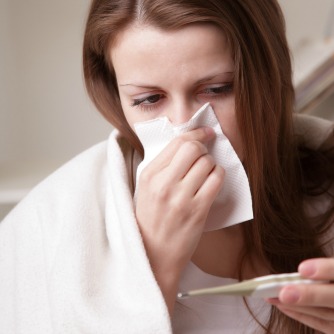PREVENT THE FLU!
Products for the Immune System
Products for Respiratory Tract

Seasonal influenza is caused by influenza viruses that infect the respiratory tract (especially the nose, throat and lungs). The US Centers for Disease Control and Prevention estimate that seasonal flu hits on average between 5% and 20% of the US population each year, with more than 200,000 people hospitalized from complications related to seasonal .
The flu affects the health, exposing the most vulnerable to the risk of pneumonia, ear infections and respiratory problems.
On average, epidemics of seasonal influenza cost the United States $ 10.4 billion in direct costs for hospitalizations and outpatient visits, according to the Centers for Disease Control. Since it does not include the indirect costs related to lost productivity and absenteeism of workers.
The A4M - American Academy of Anti-Aging Medicine, shares tips for preventing sensitive and symptom relief. Dr. Ronald Klatz, co-founder and President of the A4M, commented that: "In its commitment to public information and consumer awareness, the A4M suggest some orientation activities of protective equipment that can help reduce the risk of a highly infectious disease. the influence, in fact, affect not only the quality of life, but most likely also how long you live "
Flu Vaccination:
The US Centers for Disease Control and Prevention suggest that the best way to prevent the flu is to get vaccinated each year. In fact, a flu vaccine administered during a season, or an infection acquired during a season, can not provide adequate protection for future seasons. The decline in protective antibody against influenza that occurs after vaccination, or after influenza infection can be influenced by several factors, including the age of a person, the antigen used in the vaccine, and the state of health of the person (for example, chronic health conditions which weaken the immune system).
Preventive actions:
The flu can be spread widely from person to person through coughing and sneezing. People with flu can spread it to others up to about 2 feet away. It is estimated that a single sneeze can project up to 4,500 viral droplets.
Here are also some good habits of hygiene are of the utmost importance to reduce the risk of contracting the flu.
1. Avoid contact with sick people. When you greet people infected, do not kiss and shake their hands.
2. Cover your mouth and nose with a tissue when you cough or sneeze.
3. Wash your hands your hands often will help protect you from germs. If soap and water are not available, use a gel for hand hygiene.
4. Avoid touching your eyes, nose or mouth. Germs are often spread when a person touches something that is contaminated and then touching your eyes, nose or mouth.
5. Clean and disinfect frequently touched surfaces in the home, at work or at school, especially when someone is sick.
6. Follow the principles of anti-aging medicine: get enough sleep, be physically active, manage your stress, drink plenty of fluids and eat nutritious food.
If possible, stay home from work, school, and commissions when you are sick. This will promote faster healing and prevents others from getting the flu.
They are active against influenza helpful:
Vitamin C reduces the duration of colds and flu, and helps to combat secondary bacterial infections that can accompany a cold. Vitamin C can also reduce the symptoms and duration of infection of other viruses, such as mumps, herpes, measles ...
Vitamin D is a potent modulator of the immune system.
Selenium is a powerful antioxidant; may be beneficial for people whose oxidative stress is high, such as those with inflammatory or infectious diseases, including influenza.
Green Tea: polyphenols are known to stimulate the production of several immune system cells, in addition to possessing antibacterial properties.
Glutathione is a tripeptide composed of three amino acids: glycine, glutamic acid (glutamate) and cysteine. Glutathione has been called the "master antioxidant." In addition to its powerful antioxidant, glutathione helps to recycle other antioxidants such as vitamins C and E. The results of several studies suggest that glutathione also has antiviral properties: it inhibits the activation and replication of influenza virus.
Probiotics: Probiotics are dietary supplements that contain live microorganisms that colonize the intestine and help to prevent intestinal infections. The lactic acid bacteria, such as Lactobacillus acidophilus, are the strains most commonly used in probiotic products. Probiotics can help strengthen the immune system.
Source: Worldhealth
Products for the Immune System
Products for Respiratory Tract
